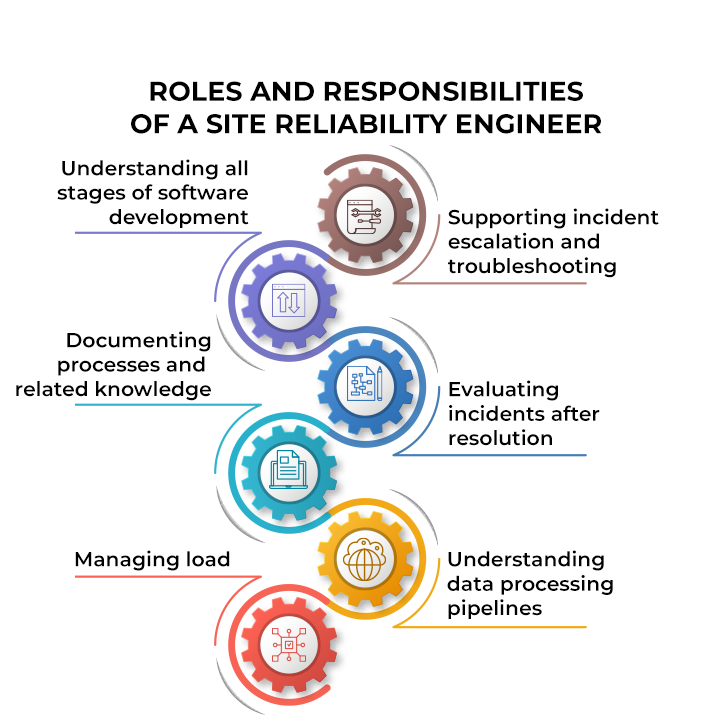1. What is Site Reliability Engineering (SRE):
Introduce SRE, discussing tools and technologies commonly used, such as Prometheus, Grafana, Kubernetes, and Terraform, along with core concepts like reliability engineering and monitoring.

2. Why SRE is Important:
Explain SRE’s role in ensuring reliable, scalable, and highly available systems, bridging the gap between development and operations, and supporting DevOps goals.
3. Course Features:
- Comprehensive training on SRE principles and best practices
- Hands-on labs and real-world scenarios
- Industry-recognized certification upon completion
- Access to course materials, templates, and tools
4. Training Objectives:
- Master the SRE framework, tools, and methodologies
- Build expertise in automation, monitoring, and incident management
- Develop the ability to scale systems with reliability and resilience

5. Target Audience:
- IT Professionals, System Administrators, DevOps Engineers, and Developers
- Individuals with experience in IT operations, networking, or cloud services
6. Training Methodology:
- Interactive lectures and group discussions
- Practical lab sessions
- Case study analysis and troubleshooting exercises
7. Training Materials:
- Handouts covering SRE principles
- Presentation slides
- Video tutorials and guides for tools like Prometheus and Grafana
- Access to a dedicated lab environment
8. Evaluation:
- Pre-test and post-test to measure knowledge gain
- Participant feedback surveys to gauge course impact
- Hands-on lab assessments to ensure practical skills
9. Certifications Program:
Additional certifications in DevOps tooling (e.g., Kubernetes, Prometheus)
Site Reliability Engineering (SRE) Master Certification
10. Agenda (Daywise):
| Day | Agenda |
|---|---|
| Day 1 | Introduction to SRE and DevOps Foundations |
| Day 2 | Monitoring, Alerting, and Incident Management |
| Day 3 | Automation with SRE Tools (e.g., Terraform, Ansible) |
| Day 4 | Scaling and Performance Engineering |
| Day 5 | Incident Response, Troubleshooting, and Q&A |
11. Trainers:
Rajesh Kumar, DevOps and SRE specialist, trainer from www.Rajeshkumar.xyz
12. Lab Setup:
- Virtual machines configured with Kubernetes, Prometheus, and other necessary tools
- Sample applications to simulate real-world environments
13. FAQ:
| Question | Answer |
|---|---|
| Q1: What is the purpose of SRE in DevOps? | A1: SRE focuses on reliability, bridging the gap between operations and development in DevOps. |
| Q2: Are there prerequisites for this course? | A2: Basic knowledge of Linux and cloud computing is beneficial. |
| Q3: Will hands-on labs be provided? | A3: Yes, extensive labs are part of the course. |
| Q4: What tools will I learn in this course? | A4: You will work with tools like Prometheus, Grafana, Terraform, Kubernetes, and more essential SRE tools. |
| Q5: Is this certification globally recognized? | A5: Yes, it is backed by DevOpsSchool.com and led by expert trainer Rajesh Kumar, which adds to its global validity. |
| Q6: How is this course delivered? | A6: The course is delivered through a mix of lectures, hands-on labs, group discussions, and real-world case studies. |
| Q7: How long does the certification remain valid? | A7: The certification is valid indefinitely; however, it’s recommended to stay updated with the latest SRE practices. |
| Q8: Can I retake the course if I don’t pass the certification exam? | A8: Yes, you can retake the course or opt for additional sessions to reinforce learning if needed. |
| Q9: What roles can this certification help me qualify for? | A9: This certification prepares you for roles like Site Reliability Engineer, DevOps Engineer, and System Engineer. |
| Q10: Will I have access to course materials after completion? | A10: Yes, participants have lifetime access to course materials and future updates on tools and best practices. |
Videos
What do aspirants think about our certification?
Aspirants generally view the SRE Training Course & Certification as a valuable stepping stone in their careers, especially with the backing of industry experts like Rajesh Kumar and DevOpsSchool.com. Here’s a summary of common feedback points:
- Credibility and Recognition: With DevOpsSchool’s approval and Rajesh Kumar’s expertise, aspirants believe this certification boosts their resume and adds weight to their profile in the tech industry.
- Hands-On Approach: Many appreciate the practical lab sessions and real-world scenarios that go beyond theoretical learning, preparing them for the actual challenges faced in SRE roles.
- Comprehensive Curriculum: Aspirants find the course covers all critical aspects of SRE, including automation, monitoring, and incident management, which they see as essential for a well-rounded skill set.
- Career Advancement: Several participants highlight that SRE skills are highly sought-after, making this certification a potential door-opener for advanced roles in DevOps and reliability engineering.
- Confidence and Skill Development: The structured objectives and interactive learning methods make participants feel more confident in handling complex infrastructure and scaling challenges.